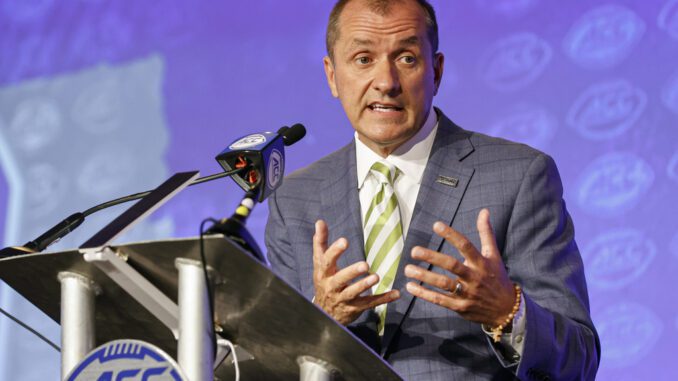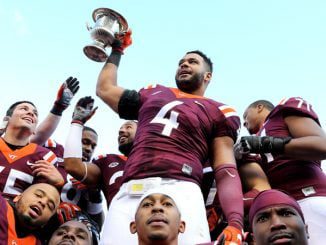
ACC Commissioner Jim Phillips briefly addressed the lawsuit filed against him for his alleged responsibility for the hazing scandal at Northwestern.
Two former members of the Northwestern football team identified as John Doe 2 and John Doe 3 filed suits last week naming Phillips, who was athletics director for the school at the time. The John Doe plaintiffs who named Phillips as a defendant were members of the football team from 2018-22. Phillips left Northwestern to replace John Swofford as ACC Commissioner in 2021.
The complaints allege “longstanding issues involving hazing and bullying that takes on a sexual and/or racist tone” and accuse former football coach Pat Fitzgerald of enabling “a culture of racism and/or other microaggressions” on the football team. The school ended Fitzgerald’s tenure as coach when reports of the hazing scandal first surfaced earlier this summer. Attorneys have said misconduct extended to other sports as well.
Shortly after the suits were filed, Phillips released a statement, saying, “This has been a difficult time for the Northwestern University community, a place that my entire family called home. Over my 30-year career in intercollegiate athletics, my highest priority has always been the health and safety of all student-athletes.
“Hazing is completely unacceptable anywhere, and my heart goes out to anyone who carries the burden of having been mistreated. Any allegation that I ever condoned or tolerated inappropriate conduct against student-athletes is absolutely false. I will vigorously defend myself against any suggestion to the contrary.”
Tuesday’s commissioner’s forum in Charlotte, which annually opens the ACC’s football media days, was the first public appearance by Phillips since the suits were filed. Phillips addressed several issues facing the league and college sports during his opening statement, which lasted more than 28 minutes of the 53-minute forum. As he concluded his remarks and was about to take questions from the assembled media, Phillips said, “I’d like to address the ongoing matter at Northwestern. I’m sure some of you have questions.”
Phillips said that he “released a statement last week,” then repeated much of what was said in that statement.
“This is a very difficult time for the Northwestern community, and my heart goes out to any person who carries the burden of mistreatment or who has been harmed in any way,” he said. “During my 30-year career in college athletics, my highest priority has always been the health and safety of all student-athletes.”
Phillips then concluded his statement by saying, “As you know, with this matter in litigation, I’m unable to share anything more at this time. I’d be happy to address your questions about the ACC and ACC football.”
The media did not have any follow-up questions regarding the Northwestern situation, instead focusing on the other issues Phillips addressed in his remarks.
Outside of the Northwestern hazing accusations, Phillips covered a number of topics in his forum. The commissioner addressed the reports that several member schools were considering leaving the league over financial concerns.
“I’m well aware of the stories and narrative surrounding our members, about our financials” Phillips said. “These are not new.”
Phillips said that the league has worked out most of the issues some members may have had after discussing the matter thoroughly at the league meetings earlier this year.
“I’m proud that our presidents and chancellors continue to have healthy and honest conversations about working together,” he said. “The league is healthy. It just is. And certainly, there’s rumblings. Again, we all saw what happened in the springtime. But the group has come together in a way, to me, that demonstrates they want to work together to find solutions.”
Phillips admitted that the league is in third place, behind the SEC and Big Ten—the two conferences that member schools were reported to be considering leaving the ACC to join. He said that it was “a good position” to be in, “but we want to close the gap.”
“Are we chasing a dollar amount, or are we chasing success?” Phillips said. “I think there is a difference. Chasing a dollar amount takes you down a different path.”
Phillips also called for a federal solution to NIL issues, calling the current situation a “race to the bottom” and a “patchwork of inconsistent state laws.” Phillips criticized schools that use collectives as a way to essentially pay players for attending the school—including many league members—for circumventing the intent of NIL rules.
“There’s a need to reaffirm that the student-institution relationship is just that,” he said. “Our athletes are students, not employees.”



